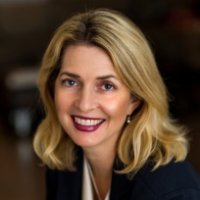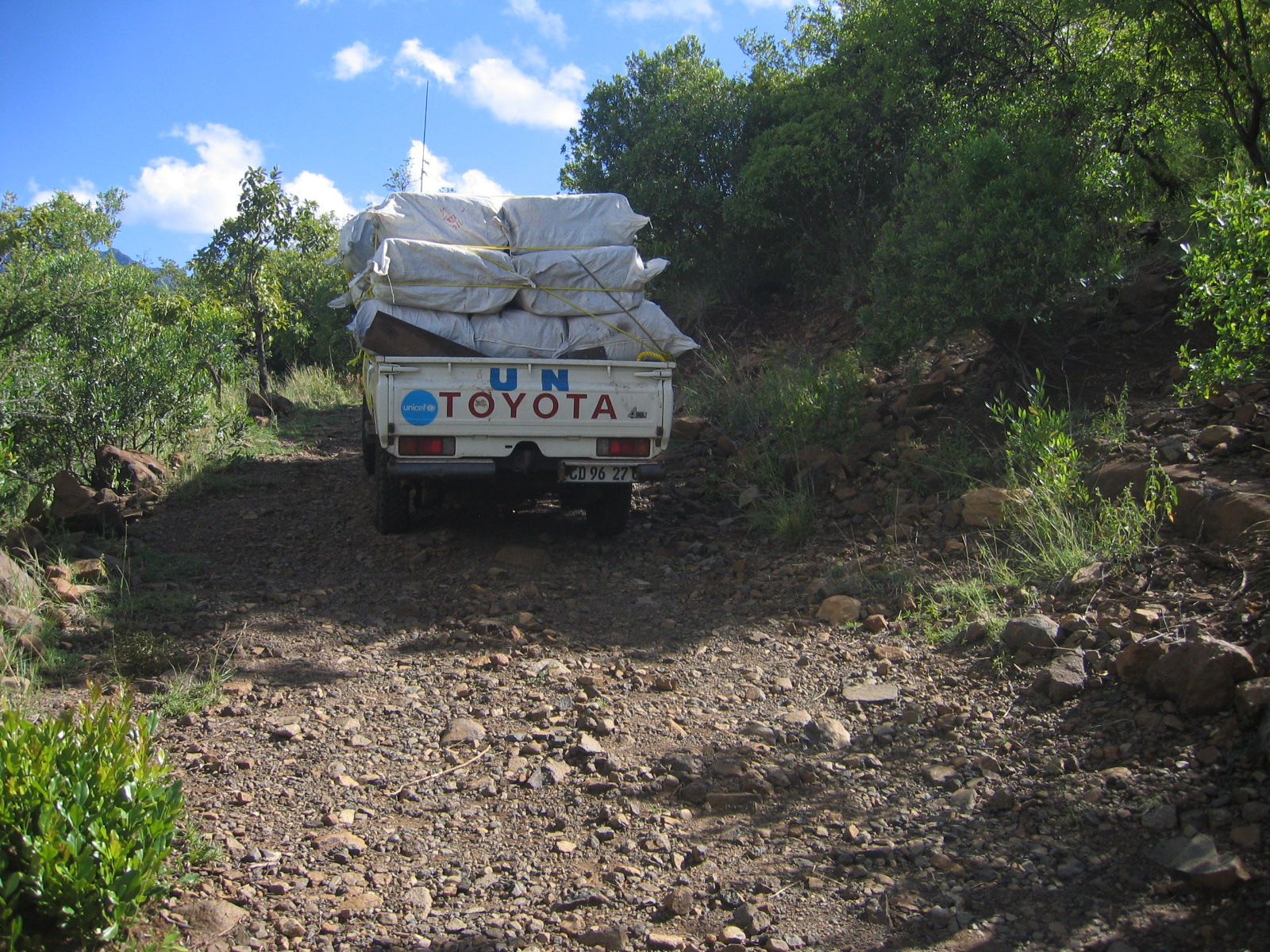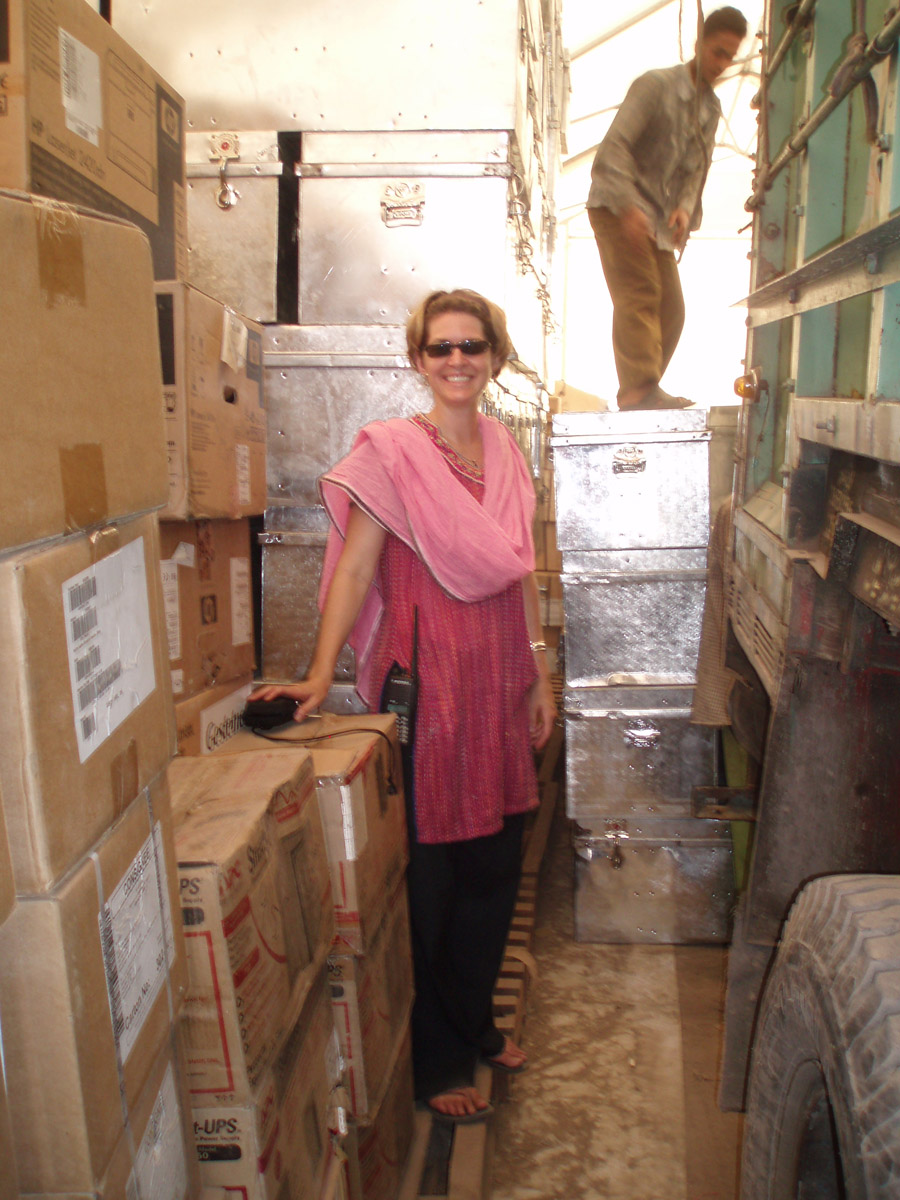How Anna Marie Spindler translated a corporate career in supply chain management to humanitarian work with the UN
In 2006, Anna Marie Spindler got a call that would change the course of her life. In under a month, she went from working at a major semi-conductor company in Hillsboro to working for UNICEF, the United Nations Children’s Fund, out of a tent in the mountains of Pakistan-administered Azad Kashmir (P.A.K.). Part of her role as an Emergency Logistician was to coordinate a Back to School campaign, distributing school supplies in the earthquake-affected valleys of P.A.K. But it meant uprooting her life in Oregon and moving to Muzaffarabad, Pakistan.
 We chatted with Anna about how she made such a life-changing decision, some of the obstacles she had to overcome, and what the past 10 years have brought for her since taking that first United Nations (UN) assignment.
We chatted with Anna about how she made such a life-changing decision, some of the obstacles she had to overcome, and what the past 10 years have brought for her since taking that first United Nations (UN) assignment.
Q. How did you make that first connection with the United Nations?
A. At the time, I was working as a Senior Buyer at Fujimi Corporation in Tualatin. I’d worked there over the course of 10 years, and while I liked my job, I craved something more, but I didn’t know what. I started my MBA in January 2005 at Marylhurst University, and in May that year, I went to Honduras with my father, who has throughout my life led various types of missions trips around the world. This particular trip was to build a wheelchair distribution and repair shop in the mountains of Honduras.
My role was to buy all the things for the construction site at the market and have them delivered to the work site. It was far from the first time I had done humanitarian work, but it was a turning point for me. I felt a connection with the local people I’d met, and I was inspired that my procurement and supply chain skills could be used to help contribute to a community. I came back to Oregon and said to myself that I wanted to do something like that full time. The next week, while back at work at Fujimi, a colleague had a visitor, and he worked at the United Nations. I’d never considered a career there and asked if they had procurement or supply chain positions. He laughed (as there are many) and told me how and where to apply online. For the next year, I applied to positions and never heard anything back. In May 2006, I ran into an old friend, who had worked for UNOPS in Afghanistan (editor note: United Nations Office for Project Services). He offered to send my resume to some old colleagues of his, and I didn’t think much of it, until about three weeks later I got the phone call from the UNICEF Pakistan office.
Q. Getting ready for such a big move must have been challenging. What were some of the obstacles you faced?
A. Well, for one thing, I was about two-thirds through my MBA program at Marylhurst. I had invested too much of myself into the program to walk away without my MBA. Luckily, the folks at Marylhurst were really accommodating. They let me put my studies on hold for the seven months I was in Pakistan, and made it really easy to transfer into their fully online program. After Pakistan, I was assigned to UNICEF Supply Division Headquarters in Copenhagen, Denmark where I was able to take classes online and finish my MBA in 2008.

Q. That’s great. Do you think it was your education, or work experience, that helped you land the UN assignment?
A. Both contributed, but to say it was any one or two things would not be true. Clearly, my technical background in supply chain management was essential to even getting an interview. My education also played a key role as at the time, UNICEF was changing its policy; they would not hire people at certain levels without a master’s degree. I actually delayed getting my MBA for 10 years after my undergraduate degree. I felt like I didn’t have time for it (as I had a demanding career already) and that it was more of a box-ticking exercise to earn an MBA. However, what I found really surprised me. I loved it. It was tough to work and go to school, but I have to say that my classes were interesting and made so much sense to me after working in the business world for 10+ years.
Q. And now you’ve worked for the UN for 10 years – correct?
A.That’s right. I have worked for three UN agencies over the past 10 years. Most people know UNICEF, the United Nations Children’s Fund, and that’s where I got my start. I really enjoyed that first assignment in Pakistan. It was a deep field emergency response position in a culture so different from my own. Every day I felt like I learned something new, and although it was a tough duty station (we lived in tents), that experience inspired me to continue a career in the UN. My next assignment was in UNICEF Supply Division Headquarters in Copenhagen, Denmark where I did a comprehensive emergency supplies review. It was interesting, but after a year I was eager to return to the field. So I took a logistics position in UNCIEF Uganda Country Office in East Africa and spent nearly four years there managing the Procurement and Logistics function. UNICEF is such a dynamic organization with a broad range of programs for women and children; it made my job very interesting. I especially liked preparing, planning and delivering the integrated health campaigns in the remote and hard to reach areas. I really enjoyed being closer to the beneficiaries.
Q. Let’s talk about that. Clearly, supply management for humanitarian organizations is different from your past corporate work.
A. Most definitely. When I was streamlining processes in the corporate world, I was saving money and time. That’s a valuable contribution, for sure, but in humanitarian organizations, delivering supplies more efficiently can be life-saving.
Q. So after UNICEF, where did you go?
A. I went to Budapest, Hungary to lead global procurement section for the United Nations High Commissioner for Refugees (UNHCR). I’ll be returning there soon to head their global supply chain and logistics service. In between, I was at UNOPS for three years, as the Deputy Director for the Procurement Group. All of my assignments with the United Nations have drawn on, and added to, my supply chain management and operations experience.
Q. What’s next? Do you think you’ll stay with the UN until retirement?
A. My life often has surprising turns. So I can’t say for sure, but I would like to stay in the United Nations for at least another five years, and possibly more. I am enjoying writing, and I feel I have a few books in me. That might need to wait until I retire. For now, I am also passionate about teaching and sharing experiences with students. I would have loved to have someone tell me about international careers in humanitarian work when I was in school. I plan to do more with universities and youth to inspire them to participate in helping others, be it in their own community or country or internationally.
Q. Many folks look forward to traveling the world when they retire. What about you?
A. I love to travel and always have for as long as I can remember. I have traveled to more than 60 countries, and so I have stopped counting. I do want to go to Australia. It’s the last of the seven continents that I have to visit. For retirement, it might be nice to settle in one place for a change– perhaps come back to Oregon as I have a house in Hood River, or maybe return to western Michigan, where I was born and raised. But you never know … I’m open to all kinds of possibilities and feel I could pretty much live anywhere.


